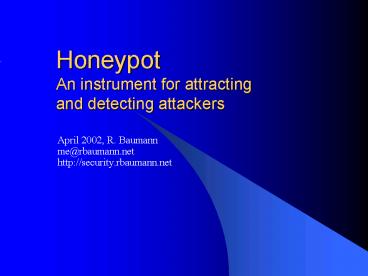Honeypot An instrument for attracting and detecting attackers - PowerPoint PPT Presentation
1 / 22
Title:
Honeypot An instrument for attracting and detecting attackers
Description:
A honeypot is expected to be attacked or compromised. The main goals are the distraction of an attacker and the gain of information about an attacker, ... – PowerPoint PPT presentation
Number of Views:1605
Avg rating:3.0/5.0
Title: Honeypot An instrument for attracting and detecting attackers
1
HoneypotAn instrument for attractingand
detecting attackers
- April 2002, R. Baumann
- me_at_rbaumann.net
- http//security.rbaumann.net
2
Agenda
- Theory
- Implementation
- Administrations Toolkit
- Attacks
- Conclusion
3
TheoryHoneypot
- Term originally from the military
- Fake target or ambush
- In this presentation, the term honeypot is used
in network security environment
4
TheoryDefinition
A honeypot is a resource which pretends to be a
real target. A honeypot is expected to be
attacked or compromised. The main goals are the
distraction of an attacker and the gain of
information about an attacker, his methods and
tools.
5
TheoryBenefit
- Productive environmentdistraction from the real
targets - Research environmentinformation gathering
- but
- No direct protection gained
- In difference to IDS no false alerts
6
TheoryTypes of implementation
- Level of Involvement
- Low Involvement Port Listeners
- Mid Involvement Fake Daemons
- High Involvement Real Services
- Risk increases with level of involvement
7
TheoryHoneynet
- Network of honeypots
- Supplemented by firewalls and intrusion detection
systems - Advantages
- More realistic environment
- Improved possibilities to collect data
8
ImplementationProjekt Honeybread
- Honeynet implementation
- Administration Toolkit
- Ethernet Tunneling Software
9
ImplementationSchematic illustration
Honeypots
Detection
Internet
10
ImplementationTopology
11
ImplementationHoneypots
- Multiple honeypots
- Virtual machines
- Different, independent systems
12
ImplementationDetection unit
- Information logging
- Connetion controll
- Administration
13
Administration InterfaceFeatures
- Web-based
- Event visualization
- Connections from and to the honeynet
- Intrusion detection system alerts
- Session logs
- Statistics and reports
14
Administration InterfaceScreenshot
15
AttacksFacts
- Huge amount of IDS alerts (gt40000)
- Mostly automated attacks
- Code Red Virus
- In less than 24 hours successfully attacked
- Well known security vulnerabilities used
16
AttacksIDS alerts
17
AttacksDistribution over time
18
AttacksOrigin
19
AttacksSummary
- Amount of attacks surprised
- Origin of attacks mostyl from local systems
- Attacks on own subnet
- Most tools use own subnet as default setting
- Conclusion
- Protection required and possible
20
SummaryTechnology
- Honeypot as a safety solution not very attractive
- Very time expensive
- No out-of-the-box solutions
- Risk quite high when used inappropriate
- Deep knowledge needed
- Legal situation uncertain
- Honeypot as a service very attractive
21
SummaryImplementation
- Data analysis very complex and time consuming
- Very good learning results
- Very interesting research area
- Exciting and suprising moments
22
Thank you very muchfor your attention































